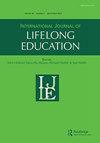40年来的终身教育研究——来自《国际终身教育杂志》的见解
IF 1.9
Q2 EDUCATION & EDUCATIONAL RESEARCH
引用次数: 2
摘要
通过这期《国际终身教育杂志》特刊,我们完成了为期两年的庆祝活动,并在该杂志四十周年之际对成人终身教育领域进行了批判性审查。在这篇社论中,我们简要介绍了这一庆祝活动及其理由,但也关注了该杂志本身的起源和早年。这包括报道该杂志前16年编辑的三个人中的两个人的一些回忆。它还涉及反思这一时期成人教育学术领域的一些显著发展、“转折”和事件,以及该杂志与它们的关系。然后,我们介绍了特刊本身的内容:五篇文章和两篇评论文章,这些文章借鉴并分析了该杂志40多年来发表的工作。最后,我们简要回顾一下该杂志的目标,以及保持这些目标生命力的挑战。我们在之前的两篇社论中阐述了我们四十周年“项目”的大部分背景和理由(Holford等人,2022022);一些研究结果已经发表在我们早期的特刊《国际终身教育杂志四十年:对一个不断变化的领域的思考》(第41卷第1期)中。正如我们所解释的,这些特殊问题是在编辑和编辑咨询委员会之间的讨论中产生的。这引发了各种各样的问题。一些人关心读者和受众,研究成果的框架,以及这些成果可能在何时、在谁中间以及在什么背景下“落地”。“领域”发生了怎样的变化?《以英语为中心》杂志还是“国际性”杂志?当我们开始出版的时候,关键问题是什么?成人终身教育——以及过去四十年来对其的研究——在哪些方面有助于解决人类的系统性问题?第二个讨论领域涉及如何以及应该涵盖什么:例如,关于1981年以来的这段时间如何最好地在时间上划分,进行了长时间的讨论:最终,我们认为这是40年,部分是因为这种划分,尽管是武断的,但也可能会引起人们对“缺席”和“存在”的关注,并要求我们注意到一些事情——考虑到今天的担忧——否则我们可能会忽视这些事情。在我们进行的过程中,我们确实发现了地理、种族、社会、缺席,以及各种“声音”的不同存在或不存在。与此同时,我们已经认识到了几十年来的趋势或“长队”。进一步的担忧包括重新审视“过去的未来”:反思我们(或我们的前任)对未来的想象、希望或恐惧。他们看到、忽视或忽略了什么?它们在哪些方面被证明是正确的或错误的,我们可以从中学到什么?与此同时,我们希望认识到塑造杂志和领域的(外部)事件和力量。我们预计,这些可能包括——采用过时的马克思主义术语——“物质基础”和“意识形态上层建筑”,以及具有全球意义的政治或“自然”事件。例子包括“全球化”,无论是从理论角度、意识形态还是本文章由计算机程序翻译,如有差异,请以英文原文为准。
Lifelong education research over 40 years: insights from the International Journal of Lifelong Education
With this special issue of the International Journal of Lifelong Education, we complete a two-year celebration and critical examination of the field of adult lifelong education, prompted by the journal’s fortieth anniversary. In this editorial we provide a brief account of this celebration and its rationale, but also devote attention to the origins and early years of the journal itself. This involves reporting some recollections of two of the three men who edited the journal over its first sixteen years. It also involves reflecting on some notable developments, ‘turns’ and events in the academic field of adult education during that period, and the journal’s relationship to them. We then introduce the contents of the special issue itself: five articles and two review essays that draw on and analyse aspects of the work published in the journal over four decades. Finally, we reflect briefly on the journal’s aims, and the challenges of keeping them alive. We have set out much of the background and rationale to our fortieth anniversary ‘project’ in two previous editorials (Holford et al., 2021, 2022); some of the results have been presented in our earlier special issue, Forty Years of the International Journal of Lifelong Education: Reflections on a Changing Field (Volume 41, No. 1). As we explained, the special issues emerged from discussions among the editors and editorial advisory board. These raised various issues. Some concerned readership and audience, the framing of outputs from the research, and when, amongst whom, and into what context these might ‘land’. How has ‘the field’ changed? How far is the journal Anglocentric or ‘international’? What would be the critical issues of the time when we came to publish? In what ways might adult lifelong education – and research into it over the past forty years – contribute to solutions to the human race’s systemic problems? A second area of discussion concerned how and what should be covered: there was, for example, a long discussion as to how the period since 1981 was best divided up temporally: in the end we considered it as four decades, partly faute de mieux, but also because such a division, albeit arbitrary, might draw attention to ‘absences’ as well as ‘presences’, and require us to notice things that – with today’s concerns – we might otherwise overlook. As we proceeded, we did indeed spot geographical, racial, social, absences, as well as the varying presence or absence of various ‘voices’. At the same time, we have recognised trends or ‘long lines’, extending over several decades. Further concerns included revisiting ‘past futures’: reflecting on what we (or our predecessors) had imagined, or hoped, or feared, the future might be like. What did they see, ignore or overlook? In what ways did they prove correct or mistaken, and what might we learn from this? At the same time, we wanted to recognise the (external) events and forces that had shaped the journal and the field. We anticipated that these might include – to adopt unfashionable Marxist terminology – ‘material base’ and ‘ideological superstructure’, and political or ‘natural’ events of global significance. Examples include ‘globalisation’, whether considered as theoretical perspective, ideology, or
求助全文
通过发布文献求助,成功后即可免费获取论文全文。
去求助
来源期刊

International Journal of Lifelong Education
EDUCATION & EDUCATIONAL RESEARCH-
CiteScore
3.10
自引率
27.80%
发文量
40
期刊介绍:
The International Journal of Lifelong Education provides a forum for debate on the principles and practice of lifelong, adult, continuing, recurrent and initial education and learning, whether in formal, institutional or informal settings. Common themes include social purpose in lifelong education, and sociological, policy and political studies of lifelong education. The journal recognises that research into lifelong learning needs to focus on the relationships between schooling, later learning, active citizenship and personal fulfilment, as well as the relationship between schooling, employability and economic development.
 求助内容:
求助内容: 应助结果提醒方式:
应助结果提醒方式:


